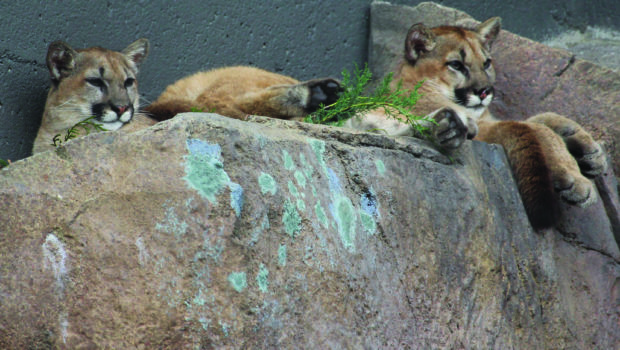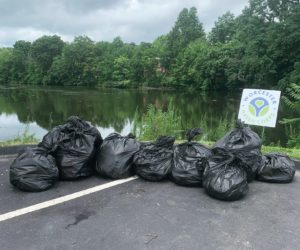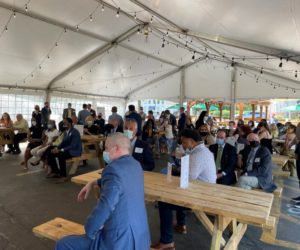This story was originally published in the August 2019 edition of the Chamber Exchange newspaper. To receive hard copies of the newspaper, contact Director of Communications Emily Gowdey-Backus, in addition, a digital copy can be viewed here.
Things are getting wild at Worcester’s EcoTarium.
In May, the museum of science and nature introduced the Wild Cat Station, an outdoor exhibit providing habitat-appropriate space to two mountain lions as well as native bird species.
Sibling kittens Salton, male, and Freyja, female, came as a package deal.
Funded by the Hanover Insurance Group Foundation, at 18,500 square feet, the Wild Cat Station is one of the largest mountain lion exhibits in the nation.
And the brother-sister bond these kittens share is certainly not out of place at the EcoTarium, an institution dedicated to creating spaces where families can connect and explore together. EcoTarium members Londyn, 8, and her brother King, 4, were viewing the mountain lions with their mom one June morning. “They’re cute and cool!” said Londyn.
Visiting the kittens for the first time with her brother Liam, 5, and her dad, Giuliana, 6.5, agreed, “I think they’re really cool!”
Now, eight years after the death of Kenda, the EcoTarium’s polar bear, Wild Cat Station has transformed her former habitat into a space uniquely designed for the pair. Enclosed with 20-foot mesh fencing, the cats have plenty of room to scale a multi-tier rock wall.
According to Rachel Stoff, the EcoTarium’s director of marketing and communications, “recent research has shown mountain lions to be crucial for the health of an ecosystem.”
Their top-of-the-food-chain hunting behaviors, she said, play an important role in population control and general ecosystem balance.
“The scraps from their kills feed hundreds of animals within the habitat, provide nutrients to the ecosystem, and consequently boost biodiversity,” explained Ms. Stoff.
Despite their significance to the ecosystem, there are many threats to mountain lions in the U.S. Among them are illegal hunting, habitat loss, wildfires, and rodenticide – the ingestion of rodent poison by an animal for which the poison was unintended.
In fact, while the eastern mountain lion was declared extinct in 2018, the western subspecies, that of Salton and Freyja, has not been classified as such.
Opened to the public May 11, Wild Cat Station provides a species-appropriate home for these two who were found orphaned in California.
“Unless these kittens are found by wildlife officials and rehabilitated, or placed in otherwise appropriate homes, they will likely not survive long without their mother to teach them necessary hunting and survival skills,” said Ms. Stoff.
“This newly-designed, state-of-the-art feline care center offers the wildlife team and veterinary partners a tremendous capacity for animal husbandry [as well as] vital storage allowing the museum staff to adapt to continually-changing best practices for animal care, training, and enrichment,” she added.
This exhibit was “envisioned as the EcoTarium’s boldest outdoor experience,” said Ms. Stoff. The completion of the Wild Cat Station marked the end of Phase II of the organization’s three-phase Third Century Plan Campaign which kicked off in 2009 as a multi-year fundraising effort focused on enhancing experiences for museum visitors into the institution’s third century of operation.
The Hanover Insurance Group Foundation’s president, Paul Belsito, said the firm is a “natural supporter of the EcoTarium” as their organization also “increasingly leverages STEM disciplines and analytics.”
Calling Wild Cat Station “a great fit,” since two of Hanover’s key focus areas are youth and education, he said: “We were especially drawn to this particular exhibit because of its unique educational value for local children and families.”
The mountain lions will be trained for a variety of husbandry-related tasks, such as crating, stepping onto a scale, presenting body parts for medical examination, and more. Ms. Stoff noted that the EcoTarium uses force-free, positive-reinforcement training, meaning these kittens are rewarded for completing behaviors asked of them and are never punished or forced to participate.
Salton and Freyja can be seen year-round at the EcoTarium alongside ongoing temporary exhibits as well as a number of upcoming events such as EcoTarium21, an after-hours series for adults 21-plus on August 23 and again on Nov. 1.
In addition, the Chamber will hold its November Business After Hours at the EcoTarium on Nov. 21.
Dominique Goyette-Connerty is a Communications and Marketing Associate at the Worcester Regional Chamber of Commerce. She can be reached via email.






